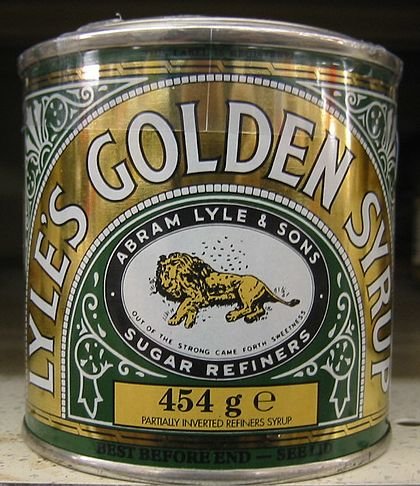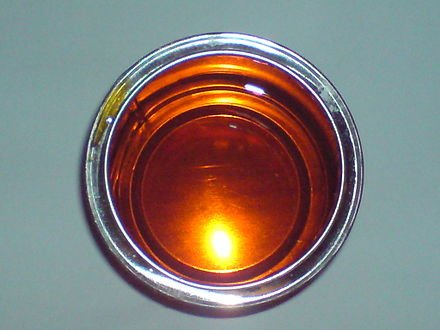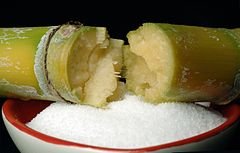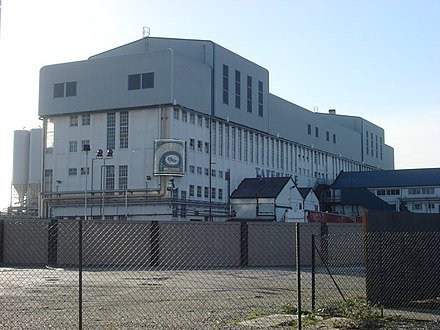British Heritage
Remember, Cherish, Learn.
beta
Golden Syrup - Tate & Lyle 1885
A Legacy of Sweetness in British Heritage.
Golden syrup, a thick, amber-coloured sweetener and preserve, has been a cornerstone of British cuisine for over a century. But beyond its culinary applications, this iconic product, primarily associated with the Tate & Lyle brand, holds a special place in British heritage. Its contribution to British culture extends far beyond the kitchen, touching upon industry, entrepreneurship, innovation, and branding longevity.
The roots of golden syrup are deeply entwined with the history of British sugar refining. The story began in 1863 when Abram Lyle, a cooperage owner, assumed control of the Glebe Sugar Refinery in Greenock to settle a debt. He noticed that the syrup—a by-product of sugar refining often discarded or sold off cheaply for pig feed—had potential as a product for human consumption.
This astute observation led to the development of golden syrup as we know it today. In 1883, English chemist Charles Eastick at Abram Lyle & Sons, a sugar refinery in Plaistow, London, worked closely with his brother John Joseph Eastick to refine the syrup into a palatable sweetener and preserve. Their pioneering work transformed the bitter molasses-brown treacle, hitherto a waste product of sugar refining, into an appealing syrup with the viscosity, hue, and sweetness of honey. The result was Lyle's Golden Syrup, a product that was commercially sold for the first time in 1885.
The distinctive green-and-gold packaging of Lyle's Golden Syrup is an enduring symbol of this iconic product. It holds the honour of being recognised by Guinness World Records in 2006 as the world's oldest unchanged branding. Its imagery and slogan, "Out of the strong came forth sweetness", draw inspiration from an ancient Biblical tale in the Book of Judges, where Samson discovers a honeycomb in a lion carcass. Although the precise reason behind this choice remains unclear, it has been suggested that it might reflect the strength of the Lyle company, or even the robustness of the golden syrup's tins.
This biblical theme not only links the product to the deeply religious beliefs of Abram Lyle but also communicates the transformative process of deriving a sweet, valuable product from an ostensibly strong and inedible source—the sugar cane. Registered as a trademark in 1904, this branding has contributed to the enduring legacy and international recognition of Lyle's Golden Syrup.
Lyle's Golden Syrup's contribution to British heritage was crowned in 1911 when it was awarded a Royal Warrant, a mark of recognition for suppliers to the royal households. This achievement underlines the product's status as a quintessentially British staple, treasured for its quality and consistency.
The history of golden syrup is also a tale of industry consolidation and evolution. In 1921, Lyle's business merged with the sugar-refining firm Tate, founded by Sir Henry Tate in 1859, creating the renowned entity Tate & Lyle. However, in 2010, Tate & Lyle divested its sugar refining and golden syrup business to American Sugar Refining. Despite this change in ownership, Lyle's Golden Syrup, produced under the licensed brand of Tate & Lyle, remains one of the best-known UK brands of golden syrup.
Golden syrup has a distinctive rich flavour and a smooth texture similar to honey. This has made it a treasured ingredient in various baking recipes and desserts, often serving as a substitute where honey is either unavailable or prohibitively expensive. Its versatility has ensured its continued relevance in modern kitchens, from traditional British steamed puddings and treacle tarts to contemporary confectionery and baking creations.
Golden syrup is produced by refining sugar cane or sugar beet juice into sugar, or by treating a sugar solution with acid, resulting in a form of inverted sugar syrup. The process is complex and requires considerable expertise. Whether through the traditional recovery of mother liquor (recovered molasses) in the production of white sugar, or by inverting half the refiner's return syrup to fructose and glucose, the result is a sweet, free-flowing syrup that never crystallises.
The term 'invert' stems from the method used to assess sugar syrups. The plane of linear polarised light passing through a sample of pure sucrose solution is rotated to the right. As the solution transforms into a mixture of sucrose, fructose and glucose, the angle of rotation reduces, giving the appearance of inversion.
Although inherently British, golden syrup's appeal is global. It is readily available worldwide, whether made from sugar cane or sugar beet. In addition to the Tate & Lyle brand, the UK also hosts brands like Silver Spoon by British Sugar and Eastick's & Ragus Golden Syrup by Ragus Sugars. It's found in South Africa, Australia, New Zealand, Canada, the US, and even Germany, Sweden, and Denmark. Each region has its variants and favourite brands, proving the universal appeal of this sweet product.
Golden syrup's journey from a sugar refinery by-product to a cherished household staple exemplifies British ingenuity and entrepreneurial spirit. Its impact on British heritage extends beyond its longevity and enduring popularity. The success of Lyle's Golden Syrup serves as a testament to the transformative power of innovation, branding prowess, and an unyielding commitment to quality—a true legacy of sweetness that has spanned generations and continues to shape Britain's culinary landscape.
Origins and Innovations
The roots of golden syrup are deeply entwined with the history of British sugar refining. The story began in 1863 when Abram Lyle, a cooperage owner, assumed control of the Glebe Sugar Refinery in Greenock to settle a debt. He noticed that the syrup—a by-product of sugar refining often discarded or sold off cheaply for pig feed—had potential as a product for human consumption.
This astute observation led to the development of golden syrup as we know it today. In 1883, English chemist Charles Eastick at Abram Lyle & Sons, a sugar refinery in Plaistow, London, worked closely with his brother John Joseph Eastick to refine the syrup into a palatable sweetener and preserve. Their pioneering work transformed the bitter molasses-brown treacle, hitherto a waste product of sugar refining, into an appealing syrup with the viscosity, hue, and sweetness of honey. The result was Lyle's Golden Syrup, a product that was commercially sold for the first time in 1885.
Symbolism and Branding
The distinctive green-and-gold packaging of Lyle's Golden Syrup is an enduring symbol of this iconic product. It holds the honour of being recognised by Guinness World Records in 2006 as the world's oldest unchanged branding. Its imagery and slogan, "Out of the strong came forth sweetness", draw inspiration from an ancient Biblical tale in the Book of Judges, where Samson discovers a honeycomb in a lion carcass. Although the precise reason behind this choice remains unclear, it has been suggested that it might reflect the strength of the Lyle company, or even the robustness of the golden syrup's tins.
This biblical theme not only links the product to the deeply religious beliefs of Abram Lyle but also communicates the transformative process of deriving a sweet, valuable product from an ostensibly strong and inedible source—the sugar cane. Registered as a trademark in 1904, this branding has contributed to the enduring legacy and international recognition of Lyle's Golden Syrup.
A Royal Endorsement
Lyle's Golden Syrup's contribution to British heritage was crowned in 1911 when it was awarded a Royal Warrant, a mark of recognition for suppliers to the royal households. This achievement underlines the product's status as a quintessentially British staple, treasured for its quality and consistency.
Industry Mergers and Changes
The history of golden syrup is also a tale of industry consolidation and evolution. In 1921, Lyle's business merged with the sugar-refining firm Tate, founded by Sir Henry Tate in 1859, creating the renowned entity Tate & Lyle. However, in 2010, Tate & Lyle divested its sugar refining and golden syrup business to American Sugar Refining. Despite this change in ownership, Lyle's Golden Syrup, produced under the licensed brand of Tate & Lyle, remains one of the best-known UK brands of golden syrup.
The Culinary Treasure
Golden syrup has a distinctive rich flavour and a smooth texture similar to honey. This has made it a treasured ingredient in various baking recipes and desserts, often serving as a substitute where honey is either unavailable or prohibitively expensive. Its versatility has ensured its continued relevance in modern kitchens, from traditional British steamed puddings and treacle tarts to contemporary confectionery and baking creations.
The Science and Production Process
Golden syrup is produced by refining sugar cane or sugar beet juice into sugar, or by treating a sugar solution with acid, resulting in a form of inverted sugar syrup. The process is complex and requires considerable expertise. Whether through the traditional recovery of mother liquor (recovered molasses) in the production of white sugar, or by inverting half the refiner's return syrup to fructose and glucose, the result is a sweet, free-flowing syrup that never crystallises.
The term 'invert' stems from the method used to assess sugar syrups. The plane of linear polarised light passing through a sample of pure sucrose solution is rotated to the right. As the solution transforms into a mixture of sucrose, fructose and glucose, the angle of rotation reduces, giving the appearance of inversion.
Global Availability
Although inherently British, golden syrup's appeal is global. It is readily available worldwide, whether made from sugar cane or sugar beet. In addition to the Tate & Lyle brand, the UK also hosts brands like Silver Spoon by British Sugar and Eastick's & Ragus Golden Syrup by Ragus Sugars. It's found in South Africa, Australia, New Zealand, Canada, the US, and even Germany, Sweden, and Denmark. Each region has its variants and favourite brands, proving the universal appeal of this sweet product.
Conclusion
Golden syrup's journey from a sugar refinery by-product to a cherished household staple exemplifies British ingenuity and entrepreneurial spirit. Its impact on British heritage extends beyond its longevity and enduring popularity. The success of Lyle's Golden Syrup serves as a testament to the transformative power of innovation, branding prowess, and an unyielding commitment to quality—a true legacy of sweetness that has spanned generations and continues to shape Britain's culinary landscape.
- Golden syrupen.wikipedia.org








